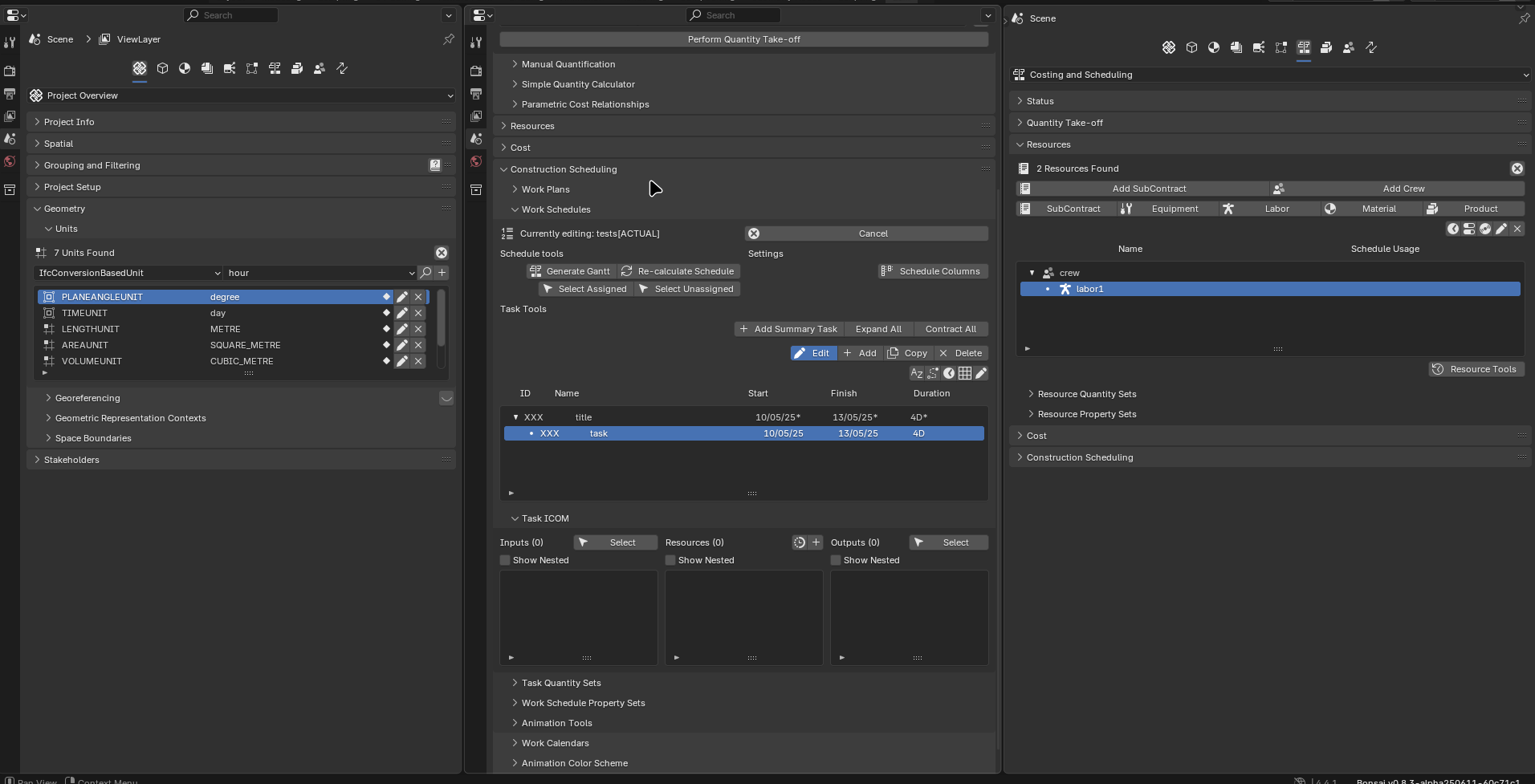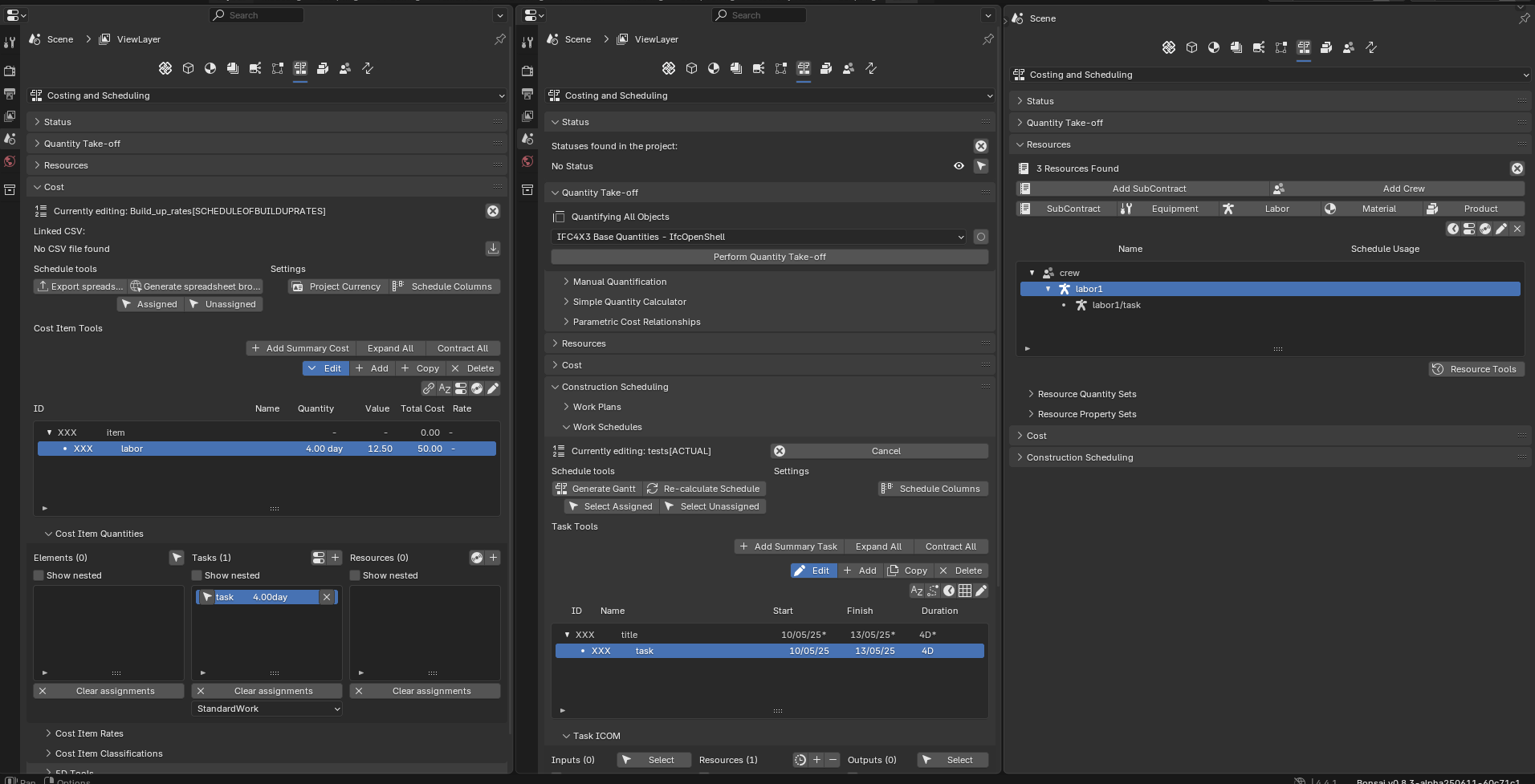Bonsai | New Feature: build-up rate NOW AVAILABLE
New 5D feature
thanks to @Massimo again for a very useful feature.
It's now possible to create a rate build-up (made up of quantified resources) and reuse it in the same or other cost schedules as well as other composite (build-up) rates.
This video shows a simple use of the new feature where construction resources are assigned to cost items and reused in a different cost item.
For Quantity surveyors using Bonsai it's a game changer, it streamlines the costing process in a modular way, only available in other QS (paid) software.
A big hurray for @Massimo and the whole Bonsai's development team, you guys are truly amazing
If you have the chance to donate please consider going to Massimo's or https://opencollective.com/opensourcebim to materially show your gratitude :)
PS my video skills are limited but I hope it's good enough to follow it, please let me know if you need further clarification
Enjoy!











Comments
@steverugi thanks to all community, it was possible only with the this awesome community help! :-)
Btw, it is a work in progress feature so feedback is welcome (as always) but it is important to understand if the "foundation concepts" are ok and right.
Wonderful! Congratulations @Massimo and @steverugi ! Good job!
Thanks
@Massimo great work! thanks. @steverugi thanks for a comprehensive explanation.
I have one question. After we create rates and build-up rates (as you show in the video), do we make this file like a library to import later. Or is there something like "import csv" as in the case for "Resources"? It would be really amazing if we could prepare a spreadsheet to import with all the resources and build-up rates that depend on those resources.
By the way, I tried this and it works great. Even in this state it's a tool of my dreams :)
@atomkarinca
Yes, having construction resources and cost items together would require to import them at the same time and maintain their connection, I am not sure how to do it. I think the same applies (to the best of my knowledge, I haven't investigated in depth) to a work schedule with resources assigned to tasks.
A workaround for Cost schedule and build-up rates is to have everything in the cost schedule itself, which is using the basic costs (what you'd have as contruction resources like cement, sand, etc.) in the cost schedule, once in there it can be imported in different .ifc models.
When a cost item uses a build-up rate based on cost items inside the same schedule the cost to item relationship can be imported as Library.
Same here, I am very grateful to @Massimo & Co. for this tool
I think you need two alternatives for importing:
One that imports one (or two) spreadsheets/csv files entirely.
And another that imports only part of that spreadsheet/csv file.
The reason for this is that in many cases, especially for public works, reference SOR databases are used that are gigantic and not used 100%.
What do you think?
@walpa
Or one special .csv that defines both resources and allocations to tasks or cost items?
I like the possibility to load just what you need from a larger dataset, and drag&drop it in the cost schedule you are editing
Resources are essential to operate in a 4D environment, otherwise the only quantity you can get from a work schedule is the time component.
Unfortunately they cannot be assigned to multiple entities (like cost items) and this limits the actual usage in a modular fashion, unless the software itself handles the price component based on their ID.
What I am trying to say is that, in a pricelist scenario handled by construction resources, they can be separately assigned to different entities but could be made "id-dependent" to update their cost value at once, in case the base cost changes. Unlike cost items, construction resources may have Psets that can be used for that purpose, if needed (?)
cheers
I'm used to seeing 2 spreadsheets, a spreadsheet of resources+prices and a spreadsheet with cost items with rates and prices, do you have an example that you can show?
The ideal (for me) would be to have a database with all the resources and SOR in independent .ifc and import what you need with an interface similar to the one used to import types in "Project Library"
I agree, treating resources as price lists is taking away all of their potential.
I think that implementing IfcConstructionResourceType would solve this.
The resource type is assigned to the SOR (the price base becomes unique) and its instances are assigned to the task schedule.
I may be talking a lot of nonsense...
Cheers
hi @walpa
it's something to devise anew, but I like the challenge
Yes, at the moment the Cost Schedule imported as library shows as a whole piece, allowing selection of cost items inside it would be quite a game changer, especially by adding them to an open cost schedule.
Yes, this is already possible, right? the missing link is how to make it shareable
Not really, at least to me
We could replicate (I think) what it's already available in a work schedule, where you have a construction resource with an assigned cost value, and multiple nested resources (instances) assigned to different tasks from which they can have their own quantity, depending from the same parent one with its own cost value.
If the same is applicable to Cost Items instead of Tasks it might be a possible solution, I need to study it a bit
cheers
I don't think it is implemented. I didn't find anything indicating this in the API documentation.
Are we thinking together?
Cheers
@walpa
how about this:
@steverugi,
I didn't know it was possible to do it that way. I learned one more thing.
I had to manually assign cost value to labor1/task. Is that what you did?
I was able to partially reproduce it, I don't know why it converted TIMEUNIT/day to TIMEUNIT/hour.
@walpa
I'd use the parent construction resource to set the Applied Value
then (if you want the quantity of your cost item to be driven by the task duration) I click on the "switch" and the "disc" icon to have it calculated in the BoQ/Cost Item
regarding the day/hour issue make sure you have it set in the "Unit" panel accordingly
kindly advise
Thanks @steverugi,
What I could see:
1- Redoing the entire process from scratch in a new file worked exactly as expected. Very cool!
2 - Trying to edit the existing file:

It keeps calculating by the hour. Very strange...
3 - The task unit assigned to the cost considers the UNITBASESUNIT (single TIMEUNIT) active in the project and not the UNITBASESUNIT of the resource assigned to the task.

Taking into account that I tried to edit this UNITBASESUNIT later and was unable to (if this is not a bug, not my idiocy and is the developer's intention) it will require a lot of attention from the user to avoid errors (IMO).
@walpa
If it helps. I didn't set any UnitBasisValue in the cost value for the construction resource, since it takes if from the quantity assigned to it.
Also, I only added 'day' in the unit and removed (not just unselected) the 'hour' unit
please advise
agree 100%
What I noticed is that once you apply any value, you cannot set the value to zero again.
Where? I didn't follow.
@walpa
Ahh, ok, thanks!
make sure you turn off the circle next to the value